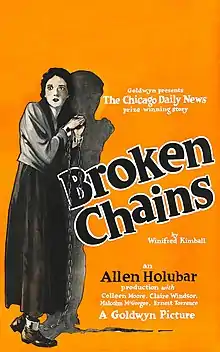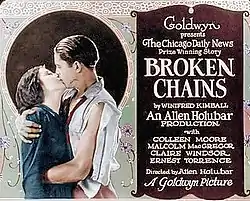Broken Chains (film)
Broken Chains is a 1922 American silent melodrama film directed by Allen Holubar. Starring Colleen Moore, Malcolm McGregor, and Ernest Torrence, it was based on the winning story from a scenario contest held by the Goldwyn Pictures Corporation and the Chicago Daily News. A print of Broken Chains is preserved at the George Eastman House archive.[1]
| Broken Chains | |
|---|---|
 Theatrical poster | |
| Directed by | Allen Holubar |
| Screenplay by | Carey Wilson Tay Garnett |
| Story by | Winifred Kimball |
| Produced by | Allen Holubar |
| Starring | |
| Cinematography | Byron Haskin |
Production company | |
| Distributed by | Goldwyn Distributing Company |
Release date |
|
Running time | 70 mins |
| Country | United States |
| Languages | Silent English intertitles |
Plot
.jpg.webp)
Wealthy Peter Wyndham is useless in attempting to prevent the theft of Hortense Allen's jewelry. A butler is killed during the robbery, and unable to face his cowardice, Peter heads west. He takes a job working for his father's lumber mill. Meanwhile, elsewhere Mercy Boone's newborn child has died. Boyan Boone, her husband is callous towards the loss. He is a thug, and ne'er-do-well with a band of thieves working with him. When Mercy attempts to escape she meets Peter before Boyan returns her to his cabin where he chains her. Peter finds her and they begin a romance under Boyan's nose. Boyan learns and beats up Peter, who summons the strength to fight him for the honor of Mercy.

Cast
- Malcolm McGregor as Peter Wyndham
- Colleen Moore as Mercy Boone
- Ernest Torrence as Boyan Boone
- Claire Windsor as Hortense Allen
- James Marcus as Pat Mulcahy
- Beryl Mercer as Mrs Mulcahy
- William Orlamond as Slog Sallee
- Gerald Pring as Butler
- Edward Peil Sr. as Burglar (credited as Edward Peil)
- Leo Willis as Gus
Production
The Chicago Daily News, together with The Goldwyn Company, held a national scenario writing contest in 1921;[lower-alpha 1] first prize was $10,000 and a Goldwyn production based on the story.[3] Among 27,000 entries, Winifred Kimball's "Broken Chains" was selected.[4] The story was then given to experienced scenarist Carey Wilson to make it ready for filming.[5][6]
Allen Holubar was borrowed from Associated First National for the project.[7] Colleen Moore was the first actor to be cast.[5] Stories in the trade press suggested concerns as to whether she would be equal to the heavily dramatic role,[8] but her prior work was not limited to comedy and she had not been typecast.[9] The role was expected to be her big break but failed to establish her as a star.[10]
Casting was complete by June and filming was started. Portions of the film were shot in Northern California, near Santa Cruz in an area known as Poverty Flats.[11] By August photography was completed.
Reception
Broken Chains premiered December 10, 1922, in New York and Los Angeles, and went into general release December 24.[12]
The Variety reviewer devoted several paragraphs to criticizing the climactic fight scene, calling it "preposterous" and reporting that the audience made fun of it. The plot overall was called "conventional"; however, the cast was commended.[13] The review in The Film Daily found the scenario disappointing and opined, "The theme suffers severely from extreme characterization in each of the principal people." The reviewer advised exhibitors that the film "will satisfy those who still like the old-fashioned type of meller" and called the posters good looking.[14]
In contrast, a review in Photodramatist, a magazine aimed at writers, praised both the story and the production: "There is the consummate handling of a subtle and really difficult theme, the sure touch in characterizations which so easily could have slipped into burlesque and bathos, the rapid piling of suspense on peril until the cumulative effect is terrific."[15] A critic for the Santa Cruz Evening News, locale of the exterior filming, singled out Moore for praise: "Colleen Moore ... attains new laurels as an emotional actress. Her work is thoroughly convincing during the difficult sequences ..."[16]
References
- Notes
- Scenario writing contests were common promotional devices at the time.[2]
- Citations
- Bennett, Carl, ed. (March 29, 2015). "Broken Chains". Progressive Silent Film List. Retrieved September 30, 2015 – via silent Era.
- Morey, Anne. "Have You The Power?". In Gregg Bachman; Thomas J. Slater (eds.). American Silent Film: Discovering Marginalized Voices. SIU Press. p. 52. ISBN 978-0-8093-8910-0.
- "The Chicago Daily News $30,000 Scenario Contest (advertisement)". The Literary Digest. 70 (11): 67. September 10, 1921.
- "27,000 Scenarios". The Film Daily. XX (5): 1–2. April 5, 1922. Retrieved September 30, 2015 – via Internet Archive.
- "Colleen Moore Will Play Lead in Prize Scenario Production". Deseret News. June 1, 1922. p. VII. Retrieved September 30, 2015.
- "Coast Film News". Pictures. Variety. LXVI (12): 34. May 12, 1922. Retrieved September 30, 2015 – via Internet Archive.
- "Holubar to Make One for Goldwyn". The Film Daily. XX (28): 1. April 28, 1922. Retrieved September 30, 2015 – via Internet Archive.
- "Green Room Jottings". Motion Picture. XXIV (10): 83. November 1922.
- Golden, Eve (2000). Golden Images: 41 Essays on Silent Film Stars. McFarland. p. 99. ISBN 978-0-7864-8354-9.
No one knew quite what to do with her: Was she an ingenue ... an action heroine ... a comic ... a dramatic leading lady?
- Codori, Jeff (2012). Colleen Moore: A Biography of the Silent Film Star. McFarland. pp. 104–105. ISBN 978-0-7864-4969-9.
- Young, Ann (1998). "Early Film Studios in Santa Cruz County". Santa Cruz County History. Santa Cruz Public Libraries. Retrieved October 13, 2010.
- "Broken Chains". Catalog of Feature Films. American Film Institute. Retrieved September 30, 2015.
- "Broken Chains". Variety. LXIX (4): 40. December 15, 1922. Retrieved September 30, 2015 – via Internet Archive.
- "Disappointing For a Scenario That Brought the Writer $10,000". The Film Daily. XXII (76): 13. December 17, 1922. Retrieved September 30, 2015 – via Internet Archive.
- Johnson, Sheldon Krag (January 1923). "Breaking in From the Top". Photodramatist: 21–24, 30. Retrieved September 30, 2015 – via Internet Archive.
- "Colleen Moore Wins Laurels in 'Broken Chains'". Santa Cruz Evening News. March 20, 1923. p. 4. Retrieved September 30, 2015 – via Santa Cruz Public Libraries.
External links
- Broken Chains at IMDb
- Synopsis at AllMovie